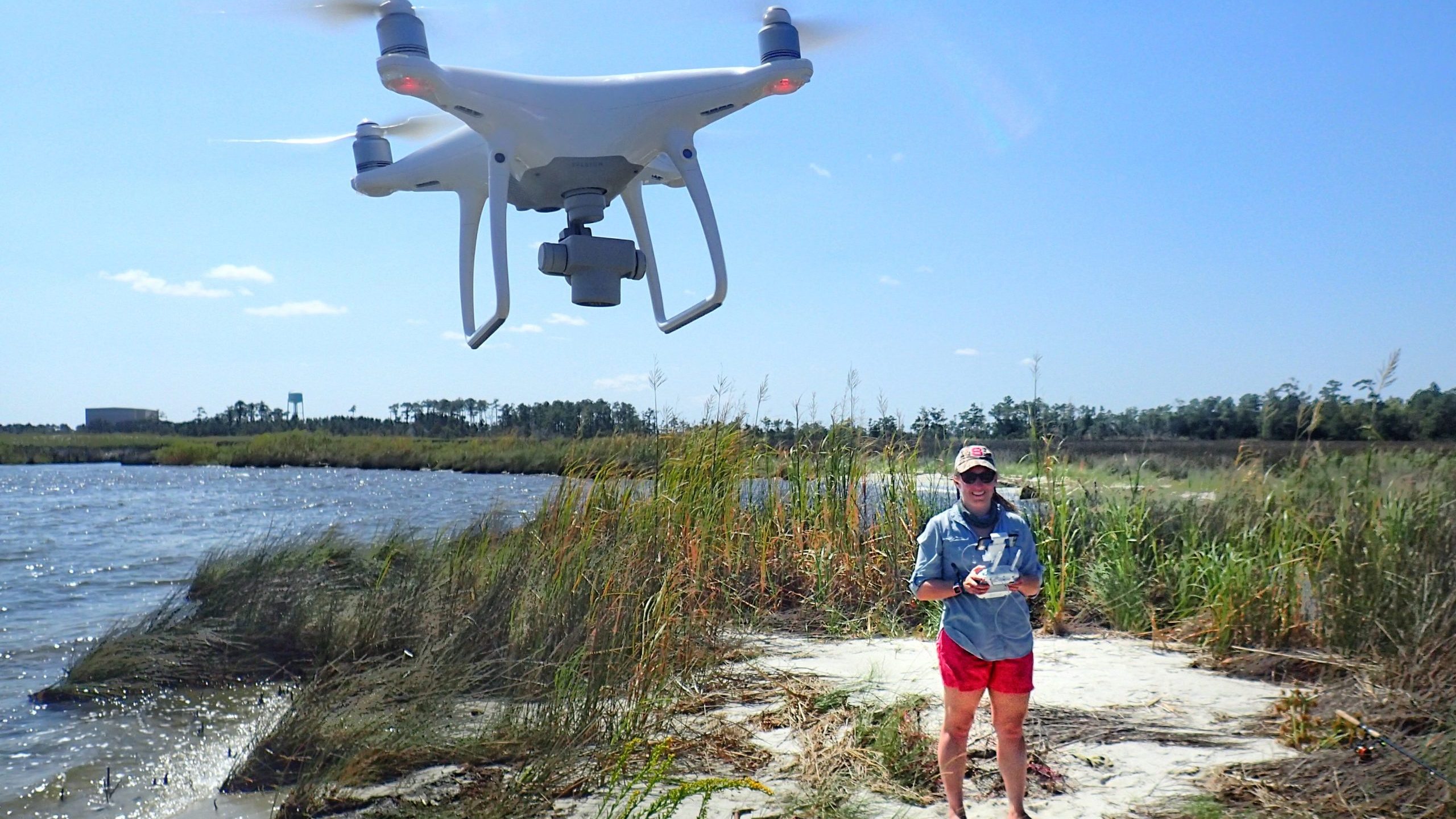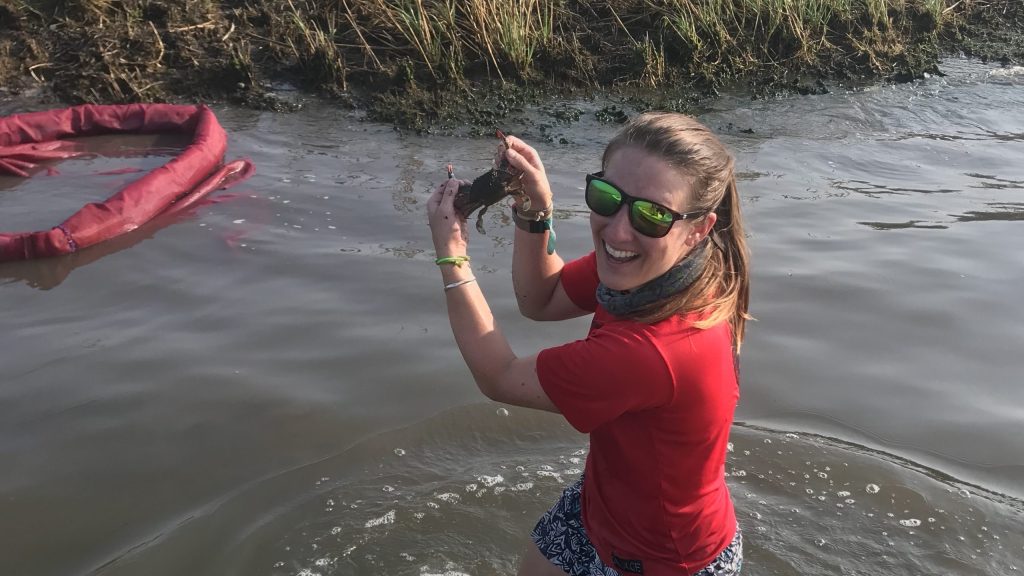Researcher Spotlight – Erin Voigt

2019-20 Global Change Fellow
PhD Student, Department of Marine, Earth, & Atmospheric Sciences
Advisor: Dr. Dave Eggleston
Every year the Southeast Climate Adaptation Science Center funds a multi-disciplinary cohort of Global Change Fellows representing colleges across NC State University. Here are some highlights about 2019-20 Fellow, Erin Voigt, and the applied research she’s conducting.
About You
What do you study?
I study juvenile blue crab recruitment and settlement dynamics focusing on nursery habitat utilization. My research looks to quantify the distribution of juvenile blue crabs across multiple nursery habitats and to better understand how factors such as storm impacts and shoreline erosion affect the availability and use of these habitats.
What (or who) influenced you to go into this field of study?
I grew up on the banks of the Chesapeake Bay and was always one of those kids that was covered in mud, catching animals, and curious about everything, so in some ways this career path was inevitable. However, I really have to credit my undergraduate alma mater, St. Mary’s College of Maryland, and the faculty there for transforming my love of nature into a passion for research and conservation.
What do you think is the most pressing issue related to global change?
I think the most pressing issue related to global change is outlook. People tend to look at global change in a binary – it is either not happening and we should ignore it or it is happening but fixing it is insurmountable. I think we need to focus on how small, incremental changes can still benefit our environment and climate. Furthermore, I think we need to remember that large, broad-scale changes aren’t impossible, nor are they something that hasn’t been done before. There are many examples in history of how quickly and effectively communities and nations have made large and swift changes once they collectively set it as a goal.
What is your dream job?
Throughout my career, I have been drawn towards scientific outreach, education, and mentorship resulting in two primary dream jobs. One dream job would be to work as a professor at an undergraduate research-driven liberal arts institution where I can help educate students on the process of scientific research and thinking as a way to promote both scientific literacy as well as train future research scientists. My other dream job would be to work at or in conjunction with a boundary organization to help produce and disseminate scientific discoveries beyond the scientific community and to the stakeholders and local communities that would benefit directly from the findings.
About Your Research

What results are you finding?
While I am still processing much of my field data, what I have found is that nursery habitats are complex and can be highly spatiotemporally variable. Preliminary results have shown that the western shore of Croatan Albemarle Pamlico sound system, particularly along the marsh shoreline of the Albemarle-Pamlico Peninsula, is a vital blue crab nursery habitat. Furthermore, this area is highly vulnerable to shoreline loss due to erosion and inundation from sea level rise.
Who will benefit from your research?
Blue crabs are the second highest grossing marine fisheries species in North Carolina and are currently listed as a concerned species due to a decreased population, particularly among juveniles. By better understanding how juveniles utilize nursery habitats we can make better management decisions to help restore the population numbers. This can provide value to the North Carolina economy, protect the jobs of North Carolina’s historical blue crab fishing industry, and benefit the consumers who enjoy eating blue crabs. Additionally, my research looking at shoreline change in relation to habitat availability will benefit the communities along the Albemarle-Pamlico Peninsula by providing them with erosion data and a better understanding of the mechanisms behind that erosion.
How can your research be used to inform management decisions?
My research can be used to inform management decisions on two primary fronts. The first is that my research into blue crab habitat utilization and the effect of erosion and storms on its availability will help fisheries managers better protect and guide blue crab stock assessment in the future. The second front is my data looking at shoreline change rates along a vulnerable high energy coastline will help land managers to better prepare for the future. I also hope that the results from my study looking at the mechanisms behind this erosion may be used to help protect this coastline from further loss.
How would you describe your research to a 3rd grader?
My research looks to better understand where the majority of baby blue crabs live. I also use drones to measure how the marshes, an important baby blue crab home, change over time and how they are affected by storms.
About Your Global Change Fellow Experience
How do you expect the SE CASC Global Change Fellows Program to impact you and your work?
Working with SE CASC as Global Change Fellow has helped me to build a network of not just fellow climate scientists but resource managers and decision makers. It has also helped me to view my research within the broader theme of global change and adaptation by introducing me to research and researchers from multiple disciplines outside of my own.
What has been the most rewarding part of being a SE CASC Global Change Fellow?
My favorite part of being a SE CASC Global Change Fellow has been getting to know and work with such a diverse array of climate scientists. Working with scientists from such a broad range of disciplines and backgrounds has really expanded my view on global change research and helped to inspire me to ask broader and more interdisciplinary questions.
What advice would you give to a student that is interested in getting involved in your field?
Don’t be afraid to ask for opportunities. It’s often difficult for new students to figure out how to get their foot in the door with marine research. One of the best strategies I have found is to find a researcher or person whose job you think you would want and reach out to them and ask them if they know of any opportunities. Most of the time if they don’t have an opportunity working with them they know of someone else that does.
